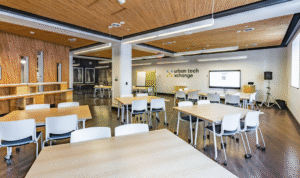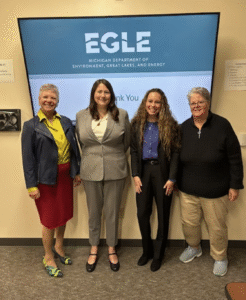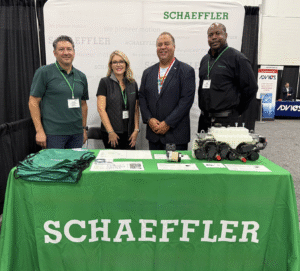
- Kim Kisner
- Events
- 05/09/2023
Nature Conservancy’s Andrew Deutz Addresses How Businesses Are Working Toward Sustainability – and What Progress Still Needs To Be Made
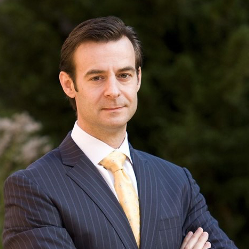
Global leaders met in Egypt in November 2022 to attend the COP27 Summit on Climate Change and again in December in Montreal for the COP15 Biodiversity Conference, reaching significant agreements to drive important changes around the globe.
How are the outcomes of those meetings affecting the world, the business community, and our lives in Michigan?
SBN Detroit hosted Andrew Deutz, director of global policy, institutions, and conservation finance for The Nature Conservancy, in a virtual event on May 4 to share his insights.
Deutz – an expert in international environmental law, policy, and diplomacy – directs the TNC’s global policy work spanning the areas of biodiversity, sustainable development, and conservation finance and oversees relationships with international organizations, multilateral development banks, and foreign aid agencies.
During this event, he addressed why these global meetings are relevant to our everyday world; what impacts we should anticipate in our decision-making as business leaders; and how The Nature Conservancy is participating in these global discussions to assure a sustainable world for both people and nature.
Moderator Tammi Dukes, Adient’s vice president of global sustainability, facilitated a Q&A session that followed.

Deutz set the stage by explaining that there is a deep Interrelatedness between climate change, biodiversity, and the global economy, and, essentially, we cannot fix one without the others. This global theme is driving the discussions and outcomes of these meetings that will in turn help inform the way businesses make and target goals, secure supply chain partners, develop sustainability practices, allocate budgets, and more.
In terms of biodiversity and climate change, there are tipping points in ecological systems as the climate warms. For example, in Southeast Asia, if we increase to two degrees Celsius we will start to lose coral reefs. If the Amazon River warms three to four degrees, the rainforest could shift to grassland. In the Arctic, we could lose permanent sea ice. All of these have repercussions on the integrity of the ecosystem and economy, and they also facilitate additional warming that exacerbates the trends.
The Montreal Biodiversity Conference informed us that more than half of the global economy is dependent on nature, and if we continue to degrade nature it will undermine the economic world as a whole.
The world currently spends $140 billion on preservation, yet also spends four to five times that amount undermining it through harmful subsidies. To become nature-positive, it is estimated that $700 billion-$900 billion is needed annually.
Deutz said to reverse the trends, we need to make changes in the global economy.
So, the question becomes, how do we address the climate crisis and nature preservation with the growing debt crisis? How do countries allocate funds toward these goals?
Deutz gave examples of countries forgiving debts in exchange for allocating funds toward forest preservation, the government buying back financial debt and replacing it with funds to spend toward climate resilience, and other alternative options that are coming out of the leadership discussions.
Deutz also noted that businesses are becoming continually more aligned with the UN’s 2030 Sustainable Development Agenda, so progress is being made.
In addition to global environmental goals such as the 2030 Agenda and the 2050 Environmental Goals, there also are tangible frameworks for companies to understand and assess climate risk so that they can measure and reduce impact; practices on how to drive decarbonization; and incentives for companies to invest in greener companies and more.
Following is the Q&A that took place after Deutz’s presentation.
Dukes: Do you think manufacturers in the U.S. are operating at a rate that will get us to the goal of carbon neutrality by 2030?
Deutz: No. But nobody is. We are making progress, but we have to accelerate that progress. There are two drivers, I think.
First, investors need to back companies that are aligned with the 2030 Agenda.
Second, we need to start seeing this happen through corporate supply chains as well. For example, in the UK and Europe, there are now trade provisions that restrict the import of commodities that drive deforestation. Companies need to be responsible for their supply chains and ensure that all parts of the chain are driving toward net zero goals.
Dukes: What is the buy-in of countries so far and what traction has been made?
Deutz: It’s a mixed bag, but we’re seeing a lot of progress. Most of the major economic players at the government level have set targets toward 2050 or 2060. Those targets still aren’t good enough, but most of the world is on a pathway.
On the nature side, it’s a little more complicated. There is a coalition of 130 countries that came together before Montreal and agreed to the 30×30 initiative, which refers to ensuring good conservation practices around 30% of terrestrial and marine habitats by 2030. There seems to be an easier consensus around that than how we sustainably manage the other 70%. Ultimately, sustainability is about 100% of the landscape being sustainable. We have a lot further to go on figuring out how to manage the 70%.
Dukes: What are the key indicators in nature that we need to pay attention to?
Deutz: There are two key indicators.
The first is vegetation cover. As the world loses vegetation coverage, it impacts water balance, and science is showing less rainfall is falling on land. As I said earlier, there is a risk of the Amazon transitioning from rainforest to grassland. Less vegetation results in less water in the atmosphere and we begin losing agricultural potential, which could turn into a global food crisis.
The second is species extinction. We are losing species at a rate of ten to 100 times faster than the rate of natural extinction, and these animals help maintain the ecosystem.
Dukes: What role can small businesses play in achieving change?
Deutz: The answer is the same as large businesses. Assess your supply chains and put the same practices into place. But yes, large businesses are being called on to meet certain criteria first, because they can, and because they can make a larger impact.
But for small companies, I would say pay attention to what the larger companies are doing. Once methodologies there are worked out, you will likely be asked to do the same.
Dukes: What tools and technology are on the horizon to assist corporations in the task of collecting metrics to measure ESG performance?
Deutz: The two technologies I’ve heard most talked about are remote sensing and AI (artificial intelligence). By combining these, you can almost conduct real-time measurements on vegetation
Satellites can detect change in forest cover and vegetation cover and make data readily available. If we combine that with AI we can look for change detection and understand more what’s going on.
Dukes: What efforts are in place to engage underrepresented communities?
Deutz: A lot is going on in the US to this end. The White House has a task force focused on environmental Injustice. There is money now from the federal government from the Bipartisan Infrastructure Bill and the Inflation Reduction Act to engage local communities through climate investments.
To be sure, we need to do better than we have in the past.
Dukes: How can I as an individual help drive down my carbon footprint?
Deutz: Switch to EV. Make sustainable consumer choices. Support politicians who are supporting this agenda.
Career choices matter too. Ask yourself: Does the work I am doing align with the agenda? For example, I have a 27-year-old nephew who is an architectural engineer. This is not a career that’s directly within sustainability, but he’s now doing energy modeling for buildings – designing buildings to minimize water and energy use. He’s not an environmentalist but every day at work he is designing the energy-efficient buildings of the future; therefore, he is making an impact.
Dukes: How engaged are U.S. municipalities in current ESG and climate change initiatives?
Deutz: A lot of innovation is happening at the municipal level. C40 is a network of mayors of 40 of the world’s leading cities united to confront the climate crisis. Cooperation and collaboration between cities are happening fast. Cities are becoming the biggest incubators of change and innovation.
Dukes: A lot of companies are in their infancy when it comes to climate control initiatives and may not be acting fast enough. How can we drive change around the mindset of companies to reach the 2050 goals?
Deutz: I will leave you with a story. We were recently working on a goal to improve grazing practices for the beef supply chain. We realized that if we really wanted to make a change, we needed to go to Arkansas to the largest grocery chain in the U.S. – Walmart. They were very open to it and we set new standards for their supply chain. What also happened that was of interest to me is the younger employees started coming out of the woodwork, raising their hands to be involved. They want to do this work. The younger generation has a strong willingness to move their companies in this direction. That’s how we will drive change.
To view the full presentation click here.
Be sure to subscribe to our newsletter for regular updates on sustainable business practices in and around Detroit.
Kim Kisner
- All
- Business
- Community
- Education
- Events
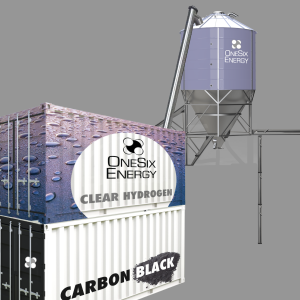
Detroit-based OneSix Energy is a clean-energy technology company focused on advancing a lower-carbon approach to hydrogen production. Headquartered at Newlab in Detroit, the startup is developing a proprietary methane pyrolysis system designed to produce hydrogen without carbon dioxide emissions, while also generating solid carbon as a co-product. SBN Detroit interviewed with cofounder Stefan Sysko about the company’s origins, its approach to hydrogen production, and why Detroit is positioned...
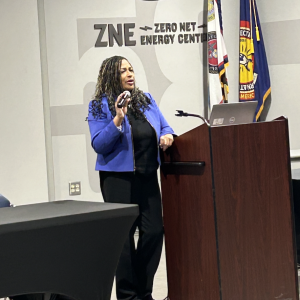
Regina Strong serves as Michigan’s first Environmental Justice Public Advocate, leading the state’s Office of the Environmental Justice Public Advocate. Her role focuses on addressing environmental justice concerns raised by communities, helping residents navigate environmental systems, and working across state agencies to improve equity in environmental decision-making. SBN Detroit interviewed Strong about the challenges communities are facing across Michigan and what environmental justice work looks like in practice....

Founded in 1965, Gensler is a global architecture and design firm working across sectors including urban development, commercial real estate, and civic infrastructure. SBN Detroit sat down with Najahyia Chinchilla, senior associate and sustainability consultant, to discuss mass timber, embodied carbon, and what sustainable construction means for Southeast Michigan. Q: Why is wood re-emerging right now as a serious option for large-scale, urban construction? A: Mass timber blends strength, sustainability, and design quality in ways few materials can. Wood has...




